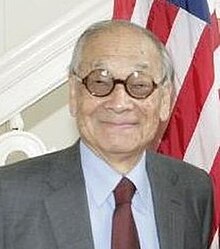I. M. Pei
Chinese-American architect (1917–2019)
Ieoh Ming Pei (26 April 1917 – 16 May 2019) was a Chinese-American architect, famous as the designer of many major works worldwide, including the John F. Kennedy Presidential Library and Museum, the Bank of China Tower, and the Louvre Pyramid.

| This article about an architect is a stub. You can help out with Wikiquote by expanding it! |
Quotes
edit- I believe that architecture is a pragmatic art. To become art it must be built on a foundation of necessity. Freedom of expression, for me, consists in moving within a measured range that I assign to each of my undertakings. How instructive it is to remember Leonardo da Vinci's counsel that "strength is born of constraint and dies from freedom."
- Acceptance speech for the The Pritzker Architecture Prize (16 May 1983), quoted in The Pritzker Architecture Prize, 1983: Presented to Ieoh Ming Pei (1983)
- Architects by design investigate the play of volumes in light, explore the mysteries of movement in space, examine the measure that is scale and proportion, and above all, they search for that special quality that is the spirit of the place as no building exists alone.
The practice of architecture is a collective enterprise, with many individuals of various disciplines and talents working closely together. And from the commissioning to the completion of a project, there are also the many individuals for whom architects work, whose contribution to quality is frequently as crucial as that of the architect. So I accept this prize for all who have worked with me in this unique undertaking. Let us all be attentive to new ideas, to advancing means, to dawning needs, to impetuses of change so that we may achieve, beyond architectural originality, a harmony of spirit in the service of man.- Acceptance speech for the The Pritzker Architecture Prize (16 May 1983), quoted in The Pritzker Architecture Prize, 1983: Presented to Ieoh Ming Pei (1983)
- For me the important distinction is between a stylistic approach to the design; and an analytical approach giving the process of due consideration to time, place, and purpose ... My analytical approach requires a full understanding of the three essential elements ... to arrive at an ideal balance among them.
- As quoted in Conversations with I. M. Pei : Light Is the Key (2000) by Gero von Boehm, p. 113